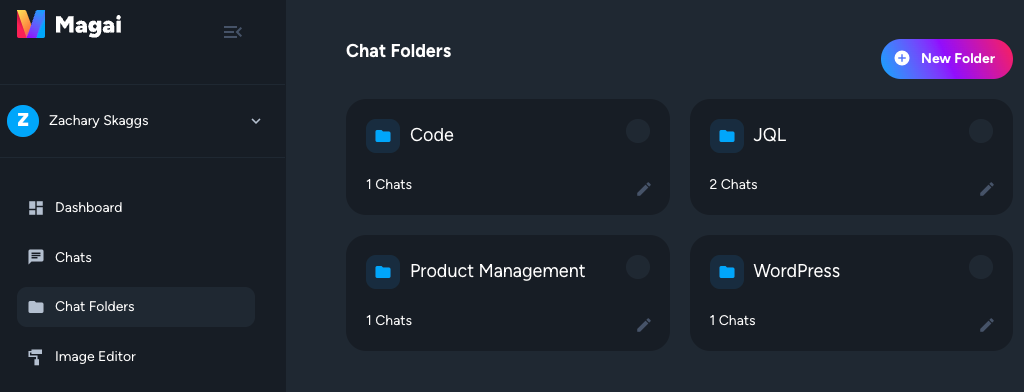*The content below contains affiliate links for Magai.co. I wrote this post before I signed up for their affiliate program. It’s a product I love and believe in.
I wasn’t diagnosed with ADHD until I was in college. In hindsight, all the signs were there but no authority figures in my life ever saw them. I was working on a paper for an education class (at the time I decided to triple major…as if that in an of itself wasn’t a major clue) when I stumbled upon the diagnostic criteria for ADHD and learned for the first time that some of these were, in fact, NOT normal day to day challenges for most people:
- Often fails to give close attention to details or makes careless mistakes in schoolwork, at work, or with other activities
- Often has trouble organizing tasks and activities
- Often loses things necessary for tasks and activities
- Often avoids, dislikes, or is reluctant to do tasks that require mental effort over a long period of time
These are just a sample of the criteria I learned were unique-to-me challenges. In my day to day life, I’ve learned to plan, adapt, and overcome most of these challenges, but some are still more difficult than others. Recently, with experimentation with ChatGPT, I learned than delegating some tasks to an AI assist could not only help me overcome some of these challenges, but that the AI could “supercharge” the adaptations I’ve already spent a lifetime learning around the handful of the challenges above, and how a new tool called Magai.co from an acquaintance of mine has made AI even more useful in my day-to-day as a neuro-spicy individual.
ChatGPT is GREAT at catching the details we might miss, especially in the planning stage
Take this small example: I want to create a tool that helps me sell something on my website.
At one of the companies I’ve worked for, a new payments feature was being rolled out to our customers right as I started. All of the original project specifications were implemented and our customers were eagerly awaiting the introduction of this new feature…but I had to “pull the andon” and stop the release because the product was missing one core release-blocking feature…receipts could not be produced from the application in any meaningful way.
To any of you who have built e-commerce systems before, this likely sounds like a huge miss…but the product and dev teams who built this app were so hyper focused on the technical integration they missed this critical part of the user experience. As an experiment, I asked ChatGPT to “Write acceptance criteria for a button on my website that sells a product through stripe.”
And it did. And it documented the criteria not only for initial receipt creation, but email receipts, error handling, confirmation messages, and more.
Now, whenever I’m tackling a new project, especially if it’s in a domain I’m not familiar with, I will bounce ideas off of ChatGPT to see if it “thinks” of something I may have missed, or uncovers an area I may need to do more research on before continuing. It saves me (and the teams I work with) from some potentially careless mistakes and ensures that our time is more effectively spent researching and building rather than putting out fires or dealing with unexpected misses in a process or user experience
ChatGPT is an organizational and task splitting powerhouse
With my particular flavor of ADHD, starting tasks is the hard part. Once I get some traction, once the flywheel starts spinning, I can surprise even myself with the amount and quality of work I can complete. But that initial phase, especially when the breadth and variation of the work is great, can be almost paralyzing.
As an example, I gave ChatGPT (via Magai.co) this prompt:
This week, I have to do two user interviews, write acceptance criteria for 5 different user tasks, story map a new feature, write three blog posts, and remember to pick my kid up from gymnastics class at 5:30pm this Friday. Can you build a schedule for me to accomplish all of these this week?
ChatGPT proceeded to build an entire schedule for the week, not just of the tasks I gave it, but with extra context as well. Here is what it gave me for Monday:
- 9:00 am – 10:00 am: Prepare for user interviews (contact participants, review questions, etc.)
- 10:00 am – 11:30 am: Conduct the first user interview
- 11:30 am – 12:00 pm: Review interview notes, and identify key takeaways
- 12:00 pm – 1:00 pm: Lunch break
- 1:00 pm – 3:00 pm: Write acceptance criteria for 2 user tasks
- 3:00 pm – 4:30 pm: Start story mapping the new feature
- 4:30 pm – 5:00 pm: Review and plan for Tuesday
If didn’t just make a list of my tasks, but it also built into my schedule time to prepare for the interviews, and time to debrief and analyze key takeaways from them. It gave me a clear, decisive plan of action, a sense of prioritization, and even built in time for me to eat lunch! By outsourcing my schedule (or even just a prioritized list), I can skip the entire “paralyzing” step and get right into the work that needs done this week.
Magai.co is awesome at organizing my ChatGPT randomness so I don’t lose important responses/context
I used to have a ChatGPT Plus subscription, but I became frustrated at the amount of downtime the system had (even with a plus subscription). Aside from the downtime, I never noticed how badly OpenAI’s implementation of conversation histories was until I experienced Magai’s handling. I have uses for ChatGPT that are professional and personal, and within those realms uses vary from being related to my day job, to various side projects, to gaming, to experimentation, and more.
ChatGPT gave me one list to “organize” all of this content, but Magai.co opened up the opportunity for me to organize my “random” thoughts across disciplines into meaningful hierarchies. I can have a folder designated just for Scheduling and Prioritization” conversations, another folder for “Blog Post Ideas”, another folder for “Product Management” work, and more. It also gives me a way to store prompts I might use repeatedly, a simple button click to copy prompts or responses to share with my team via Slack, email, or other methods, and there are more team-based features coming soon!
ChatGPT helps me break down “big” rocks into smaller, more achievable rocks.
I started an agile community at AgileWaterCooler.com several years ago that’s been incredibly valuable to my growth as an agile practitioner, leader, facilitator, and more. I have an awesome team of co-organizers that help me facilitate and run our Discord, and I’ve been looking for ways to increase our engagement to open up new opportunities for community in the long run.
This feels like a pretty big task…it’s not something I’m particularly skilled in, and it’s “bigness” and ambiguity can be a challenge in diving in and staying consistent with actions to move our organization towards growth. Recently, I asked ChatGPT:
I need a strategy to increase engagement in my Discord community related to agile development growth and leadership. Can you help me break this down into more manageable subtasks?
This prompt gave me a prioritized 12-part strategy to address this goal step-by-step…from clearly defining the communities goals and values, to inviting guest speakers, hosting challenges/contests, and more. At the very least, it’s a list I can take to our other co-organizers for feedback and refinement (which we may even refer back to ChatGPT to help us generate ideas or drill down further)!
My mental barriers are significantly reduced the more I learn to rely on my new AI assistant
I’ve been wanting to start writing content again for a few years, but despite that desire so many blockers and challenges, especially the ones above, have really hindered my ability to get started again. When I purchased my Magai.co subscription, it was partially with the intent to use it as a tool to start writing again. It has done that and more for me, and I’m so excited about what the future holds for AI technology working in tandem with a human counterpart. It enables me to focus on the things I am best at, and outsource the most challenging bits to create a bias for action. Especially if the challenges in this post resonate with you, I can’t recommend trying a tool like ChatGPT / Magai.co emphatically enough. This is a game changer, regardless of industry, and as a society we’re on the edge of something pretty incredible.



